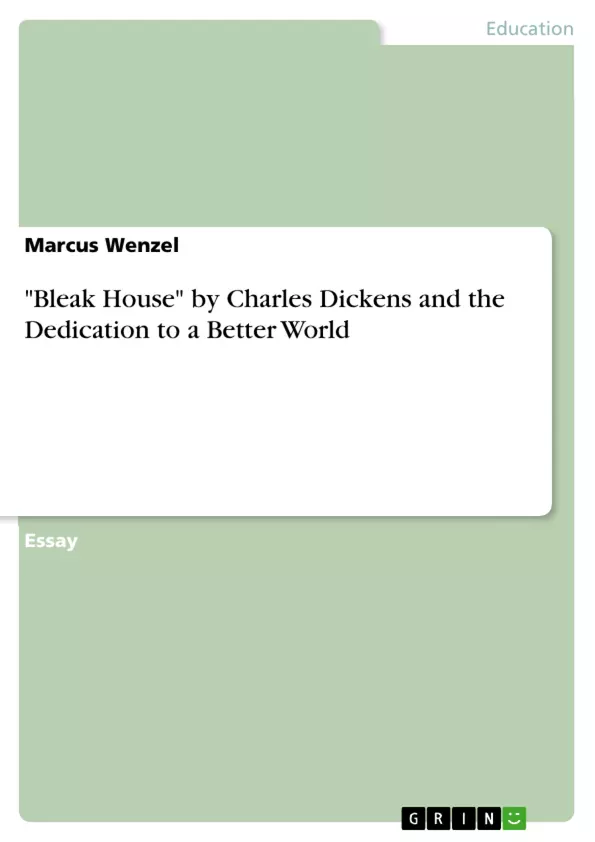To interest and affect the general mind in behalf of anything that is clearly wrong – to stimulate and rouse the public soul to a compassionate orindignant feeling that it must not be – without obtruding any pet theory of cause and cure, and so throwing off allies as they spring up – I believe to be one of Fiction´s highest uses. And this is the use which I try to turn it. This explanation by Charles Dickens about the use of fiction describes his self-imposed duty towards the British society of Victorian England perfectly. Charles Dickens was not only a novelist. He was, because of his "extraordinary nature, the durability, and the extent of his popularity" during lifetime, obliged to "a unique – public responsibility as a writer" (Slater 49).
Inhaltsverzeichnis (Table of Contents)
- The Use of Fiction - Social Reform
- The Role of Charles Dickens
- The Utilitarian Philosophy
- Utilitarianism in Victorian England
- The Poor Law Amendment Act of 1834
- The Lack of an Impartial Spectator
- Social Awareness through Fiction
Zielsetzung und Themenschwerpunkte (Objectives and Key Themes)
This essay examines Charles Dickens' critique of distorted utilitarian politics, particularly among the Victorian English aristocracy, which he held responsible for the poor's dire living conditions and bleak prospects. The research focuses on the novel "Bleak House" to provide a detailed analysis of Dickens' observations and social commentary.
- The Distortion of Utilitarianism in Victorian England
- The Social and Economic Consequences of Industrialization
- The Role of the State in Addressing Poverty and Social Injustice
- The Importance of Social Awareness and Reform
- The Use of Satire in Exposing Social Misdemeanors
Zusammenfassung der Kapitel (Chapter Summaries)
- The Use of Fiction - Social Reform: This chapter introduces the essay's focus by highlighting Charles Dickens' belief in fiction's power to expose societal ills and stimulate reform, emphasizing his commitment to social justice.
- The Role of Charles Dickens: This section explores Dickens' prominent position in Victorian society and his unique responsibility as a writer to influence public opinion on moral and social issues. It also highlights his commitment to giving voice to the marginalized and neglected members of society, particularly the poor and their children.
- The Utilitarian Philosophy: This chapter delves into the origins of utilitarianism as a moral philosophy, outlining Jeremy Bentham's ideas and John Stuart Mill's articulation of the "Greatest Happiness Principle."
- Utilitarianism in Victorian England: This section examines the application of utilitarian principles in Victorian England, highlighting the distortion of the philosophy into a justification for economic exploitation and social indifference. It analyzes the rise of industrial anarchy and the "Laissez-faire" economics that emerged, emphasizing the suffering of the working class.
- The Poor Law Amendment Act of 1834: This chapter focuses on the impact of the Poor Law Amendment Act of 1834, analyzing its consequences for the poor and the horrifying conditions of the workhouses. It exposes the government's apathy towards the plight of the working class and critiques the utilitarian justification for these harsh conditions.
- The Lack of an Impartial Spectator: This section discusses the absence of a truly impartial spectator within Victorian society, particularly in the context of the power struggle between the aristocracy and the rising middle class. It highlights Dickens' attempt to fill this gap by offering a critical voice for the marginalized and exposing the failings of the existing social structure.
Schlüsselwörter (Keywords)
This essay explores key concepts such as utilitarianism, social reform, Victorian England, industrialization, poverty, social injustice, class division, satire, "Bleak House," and Charles Dickens. It examines the distorted application of utilitarian principles, the social and economic consequences of the Industrial Revolution, and the role of literature in promoting social awareness and change.
Frequently Asked Questions
What is the main focus of this essay on "Bleak House"?
The essay examines Charles Dickens' critique of distorted utilitarian politics and the dire social conditions in Victorian England as portrayed in his novel "Bleak House."
How did Dickens view the use of fiction?
Dickens believed fiction's highest use was to rouse the public soul to a compassionate or indignant feeling regarding social wrongs and to stimulate reform.
What is the critique of Utilitarianism in the text?
The text analyzes how utilitarian principles were distorted in Victorian England to justify economic exploitation and social indifference toward the poor.
What was the impact of the Poor Law Amendment Act of 1834?
The act led to horrifying conditions in workhouses and demonstrated the government's apathy toward the working class, which Dickens strongly critiqued.
What role does satire play in Dickens' work?
Dickens uses satire as a tool to expose social misdemeanors and the failings of the aristocracy and the rising middle class.
- Citation du texte
- Marcus Wenzel (Auteur), 2013, "Bleak House" by Charles Dickens and the Dedication to a Better World, Munich, GRIN Verlag, https://www.grin.com/document/450703



